Activist and author Shannon Galpin discusses rape, empowerment, and how she managed to get the women of Afghanistan cycling.
By Deni Ellis Béchard
Shannon Galpin assembles a bike donated by Liv Cycling in Kabul. (Photo:
Deni Ellis Béchard
)
Sexual violence has dominated the news cycle lately, with accusations levied against Donald Trump (and resurfaced allegations against former president Bill Clinton) garnering hundreds of headlines. In light of the cultural conversation that has ensued, Shannon Galpin’s memoir, Mountain to Mountain, offers insight into the profound impact of sexual aggression on a woman’s life, and emphasizes the importance of speaking openly about rape and rape culture.
In her book, Galpin describes her journey to activism after being raped and almost murdered when she was 18 — beaten, cut with a knife, and left for dead in a Minneapolis park during the winter. The rapist was never found. After the attack, she found herself unable to enjoy the modern dance she had been studying and felt compelled to distance herself from the United States. She moved to Europe, where she became an outdoor guide. Years later, before the birth of her daughter, Shannon’s younger sister was also raped. Once again, the perpetrator was not caught, and she realized the importance of breaking the taboo that prevents so many women from speaking out against rape and gender violence.
During her years in Europe, Shannon made a living as a personal trainer and outdoor guide while gradually confronting her need to take action and finding her way to activism. She has since spearheaded dozens of projects for social justice and founded Mountain2Mountain, an organization that supports women’s rights in Afghanistan; along with Combat Apathy, a movement for women’s rights globally. She has taken 21 trips to Afghanistan, and, in 2009, she became the first person to mountain bike there. She also supported the first Afghan Women’s National Cycling team (who have since been nominated for the Nobel Peace Prize).
Over the years, she has received numerous honors: National Geographic Adventurer of the Year, 5280 magazine’s Humanitarian of the Year, Glamour magazine’s Hometown Heroes, and Adventure Journal’s 25 Important Women. In 2015, the International Olympic Committee awarded her an Honorary Achievement Diploma for her work promoting gender equity through sports. She is a producer for the upcoming documentary film, Afghan Cycles, and she is an advisor to Shirzanan Global, which promotes Muslim female athletes.
Here, Galpin talks with Pacific Standard about rape, victimhood, and empowering women through sports.
In your memoir, you come across as a strong individual who holds in many of her emotions. Not until after the book discusses your sister’s rape does it describe your own rape and how it affected you. Why did you choose to keep it to yourself for so long?
I still hold an enormous amount of guilt over keeping my attack private. I often think that if I had talked openly with my sister, she might have approached her own safety differently. But I was so determined not to be labeled a victim and not to have my attack define me. I was petrified of how others would treat me if they knew, so I tried to close that memory off.
My strength dramatically increased when I began talking about my rape. I understood that this awful thing that nearly destroyed me also allowed me to channel my rage into something positive. Why should I be ashamed? No victim of violence should be. I didn’t ask to be raped. I never gave permission. I was also stabbed in the attack. If I had just been stabbed, without the sexual assault, I would have immediately gone to the police. I would have told my family. But the stigma of sexual assault is pervasive even in the U.S.
I’m much more whole now that I’m talking about it. I’m more comfortable being vulnerable, although it’s still far from easy. I now know that, of course, it defined me. How could it not? But I was in control of what I did with the changes it created, and I let it empower me. Had it just been me who was victimized and not also my only sibling, perhaps I wouldn’t have taken action. But when my sister was raped and I had a daughter of my own, I wanted to shout what happened to me from the rooftops. This is happening every day to our sisters, our daughters, our mothers, and our wives. We should never stop talking about this until it stops.
Becoming a mother and your relationship to your daughter is central to your memoir, which you dedicated to her. How did having a daughter change how you saw your rape and what it means to be a victim?
I saw the world through my parent’s eyes. They had two children, both daughters. We’re 10 years apart. We were both raped. What are the odds? As it turns out, the odds are quite high. One woman every two minutes gets sexually assaulted in the U.S. One in six women in the U.S. will be raped. Having a daughter brought things rapidly into focus. I realized that, if what happened to me happened to her, I couldn’t live with myself having not done anything to combat gender violence. I couldn’t be silent anymore. Parents want to make the world better for the next generation in some way, and their daughters deserve to grow up in a world where men don’t use their bodies against their will.
As a rape survivor and an activist, you speak a great deal about what it means to be a victim. Can you explain a little about how you address issues around victimhood?
When we treat individuals or entire countries like victims, we disempower them. We disvalue them in a way that is contrary to our goals. Even if a woman had been raped and beaten, we need to see her as an individual who is capable and strong, and treat her as such. If you treat her as a victim, she’s more likely to become dependent and fearful. Fazia Koofi, the women’s rights activist, best-selling author, and outspoken Parliamentarian from Badakshan province, has said: “The time of talking about Afghan women as victims is gone. We need to be talking about their strength and their courage.” I see this in aid work as well…. The international development community often tries to fix people with money, doing projects for them rather than taking the time to empowering them, to teach them and employ them to find solutions for themselves.
For victims to find their strength, they need to find their voices. When I started to speak openly and authentically about my rape and my sister’s, I found my strength. I created a space for other women to admit their own experiences. Rape is so hidden away that it is rarely humanized. For instance, the fight against breast cancer has pink ribbons, walks, and races. Sexual assault affects a similar number of women but the shame is such that few talk openly about it. Victims have the knowledge and power to effect incredible change but only if others don’t treat them like victims.
Given the violence against women in America, why did you choose to work in Afghanistan?
The simple answer is that it’s repeatedly ranked the worst place in the world to be a woman. The girls and women there deserve the same opportunities as my daughter and I. Geography shouldn’t play a role in our rights as women. My Afghan counterparts rarely have a voice, and rape victims are frequently jailed or worse. Western media often creates the impression that all Afghans are terrorists, which hardly inspires hope that change there is worth investing in. I was interested in creating a cultural understanding of our common humanity through projects I could implement as an individual working directly with Afghans. I wanted to challenge the American perception of Afghans and the Afghan perception of Americans and women in general.
For a contemporary Westerner, it is difficult to understand the taboo against women’s cycling in Afghanistan. How controversial is it, and what are the reasons?
The act of cycling is very controversial — so much so that people throw rocks at female riders or try to run them off the road with their cars. A Human Rights Watch study states that Afghans perceive women’s cycling as a step above morality crimes like adultery. There are two reasons for this. The first is that many people still believe that riding bikes can take a girl’s virginity. Marriage in Afghanistan hinges on a new bride’s proven virginity, with the bed sheets often checked for telltale signs of blood after the wedding night. This is a barrier to all sports, but especially to cycling, where you straddle the seat.
The second reason is one that you see around the world whenever women begin to ride bikes: Bikes equal freedom of movement without a male escort. Westerners often fail to recognize that female cyclists are radical activists. Men throw stones at them or call them whores. A man on a motorcycle even deliberately ran down one of the girls on the team, injuring her. In a country where girls are sometimes still attacked with acid for walking to school, young women riding bikes in public is a major risk.
You’ve said that your work isn’t about sports but rather that the sport of cycling is a means to an end. If tomorrow, the team were to win an international race or be accepted into the Olympics, how might that change the situation for women in Afghanistan?
International sportsmanship and competition has the ability to normalize the sport as a whole, and begins a ripple effect of acceptance for bikes in general. If an Afghan woman competed in the Olympics, even in a sport as controversial for women as cycling, she would garner national pride as an Afghan athlete representing Afghanistan to the world. National pride, especially in the sporting arena, has a unique ability to change perceptions.
Where has cycling fit into the women’s liberation movement in Western countries and how has this shaped your thinking about your work in Afghanistan?
Cycling is a documented integral part of both the American and French women’s liberation movements. In America in particular, the bike was a symbol of the freedom that women were fighting for. The shift from dependence on male family members for travel to independence created a cultural shift in gender roles, as well as perceptions of immorality and promiscuity as women became less controllable.
Part of what makes the bike such an incredible vehicle for social justice is that it’s inexpensive and has no legal regulations around its use. Driving a car is less controversial in part because it’s not as accessible en masse for young women. It’s not affordable for most families in the developing world, much less for an individual woman, and driving requires lessons, exams, and legal requirements that restrict access.
Cycling’s accessibility and mobility are precisely what make it so important. In a country like Afghanistan, with high illiteracy, poor access to health care, lack of employment, and high rates of gender violence, cycling can allow women a means of transportation to attain education and enter the workforce. With bicycles, female teachers can reach rural schools where men are not allowed to teach adolescent girls, midwives can reach remote communities to prevent mortalities in childbirth, and girls can have a means of transportation to school.
You are the first person to mountain bike in Afghanistan. Why did you chose to bike there?
The rides were less about covering great distances than learning from people’s reactions and having informal conversations. The locals I encountered were engaged and curious, especially when they realized I was a woman. Men and boys would take turns riding my bike, laughing and joking. Informal question-and-answer sessions were followed by invitations to tea or dinner with families, or to visit villages. The bike became an incredible ice breaker, and it allowed me to challenge social barriers more easily than Afghan women can and help normalize bikes.
I am very careful about the areas in which I choose to ride. I speak with locals beforehand about possible dangers, and I sometimes have a local translator come with me to vouch for me and my activities should questions come up. So far, after more than a dozen rides around the country, I have yet to have an encounter that wasn’t positive. I wouldn’t ride in Kandahar or Helmand or Khost or other areas where the Taliban presence is stronger. I think carefully about where I am and try to mitigate the risk. Since my early 20s, I have traveled the world, much of it solo, and I find curiosity and friendliness is often mirrored. Despite my past experience with violence, I have learned that the world is a far kinder place than we give it credit for.
You have been developing the Afghan Women’s National Cycling Team for nearly five years now. Will biking be involved in your other activism projects going forward?
The bike will continue to play a role in my future work as I start to expand out of Afghanistan into other conflict zones, including conflict zones in the U.S. It’s a unique vehicle for social justice and change as it increases access to schools, medical care, and is a powerful tool in combating gender violence, since women on bikes are far less likely to be raped. For instance, in rural Cambodia, where secondary schools are spread out, adolescent girls have to walk long distances on empty rural roads and often get sexually assaulted. But where bikes are introduced as a mode of transportation, the sexual violence is almost immediately eliminated. It’s much harder to strike up a conversation with a girl on a bike, or to grab her. She looks more confident, and it’s also a faster mode of transportation, so she spends less time on the road.
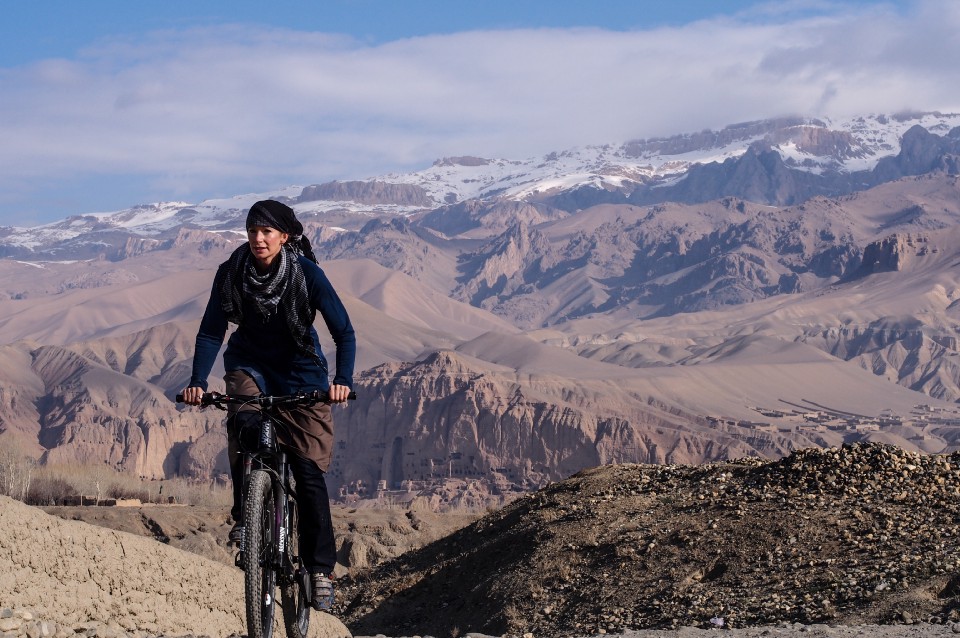
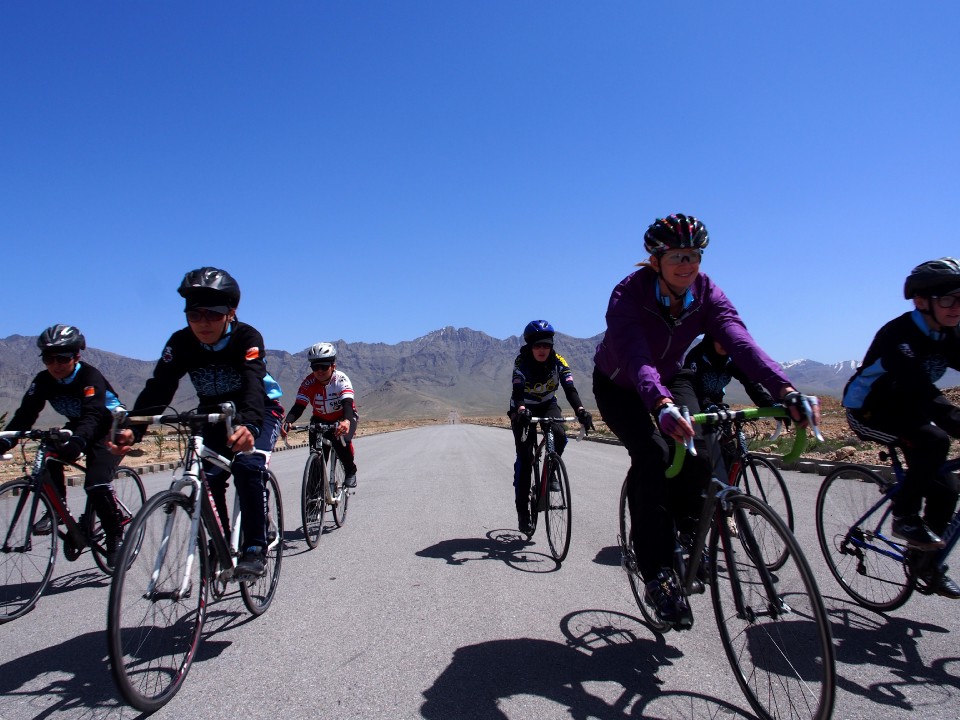
Left:
Galpin
rides in Bamiyan province. (Photo:
Deni Ellis Béchard
) | Right:
Galpin
rides with the Afghan Women’s National Cycling Team outside Kabul. (Photo:
Deni Ellis Béchard
)
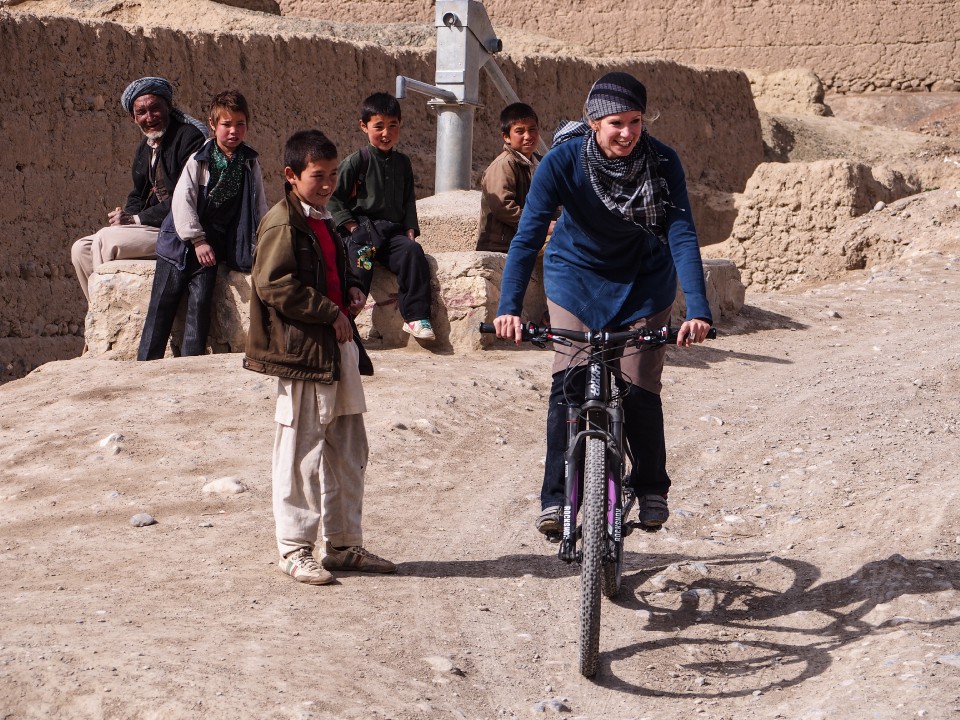
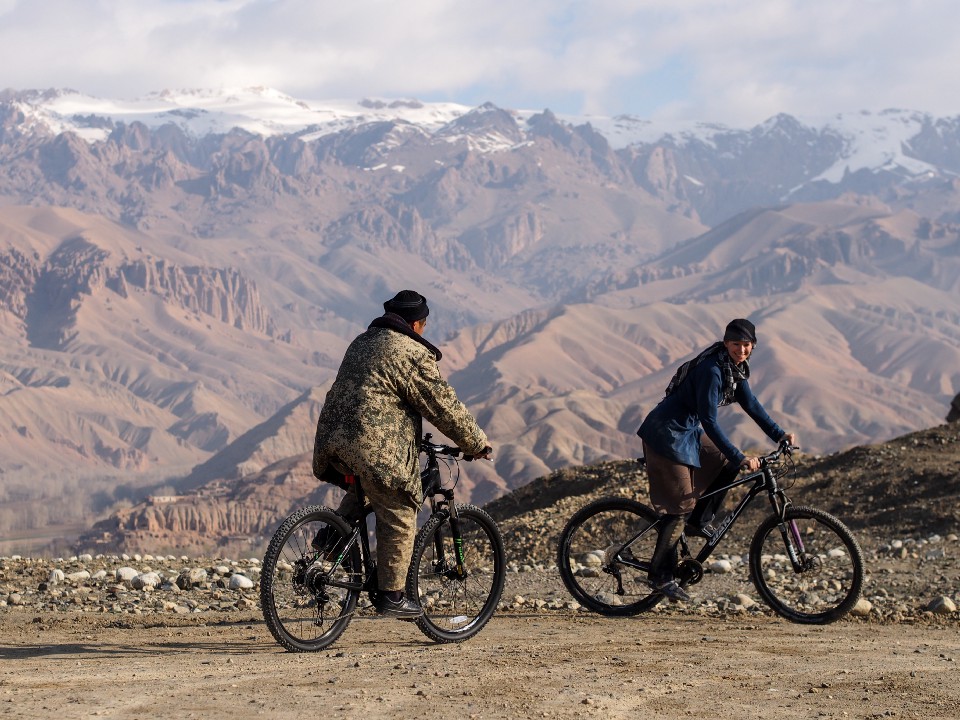
Left:
Galpin
demos her mountain bike for onlookers in Bamiyan. (Photo:
Deni Ellis Béchard
) | Right:
Galpin
rides with a soldier in Bamiyan province. (Photo:
Deni Ellis Béchard
)
In many ways, the bicycle is a cheap, sustainable tool for women’s empowerment. They allow women freedom, but, as with many sports, also increase confidence and self-awareness. Studies show that, regardless of gender, sports play a significant role in brain development. Furthermore, the University of Pennsylvania economist Dr. Betsey Stevenson’s research on American trends in girls’ sports found that they had a beneficial effect on education and employment. The World Health Organization has published a report that cites multiple research studies demonstrating that girls who participate in sports and physical activity are more likely than inactive girls to have better physical and emotional health, to get better grades, and to graduate from high school. They are also at a reduced risk of getting involved with drugs or becoming a teenage parent. Female high school athletes are 41 percent more likely to graduate from college within six years compared to female high school students who did not participate in sports. Half of all girls who participate in some kind of sport have higher than average levels of self-esteem and less depression.
How has the situation for Afghan women changed in the years since the American occupation began?
Despite Taliban destroying schools, threatening and killing female teachers, and attacking schoolgirls in some parts of the country, women’s rights have been steadily increasing in many areas. Many girls have been able to go to school, and women have been able to participate in job training. Men in rural villages may even take part in gender equality workshops to discuss issues around women’s rights. During Taliban times only an estimated 50,000 girls attended some sort of school, but now there are over 2.5 million girls getting educations. Women run for political office and even join the army and the police force. Twenty-eight percent of lawmakers are women, a higher percentage than in the U.S. and France.
Most human rights advocates believe that, when the U.S. military withdraws, women’s rights will slide backwards again as foreign donors reduce their overall financial commitment to programs. My hope is that as President Ghani tackles reforms and corruption, security will stabilize. If it continues to deteriorate, it will worsen dramatically for Afghan women. Human Rights Watch stated in its 2014 World Report that the human rights situation in Afghanistan had “regressed in key areas in 2013, increasing uncertainty about the country’s future, and a string of physical assaults in 2013 against high-profile women, including murders, highlighted the danger to activists and women in public life.” The United Nations recorded a 23 percent rise in civilian casualties for the first six months of 2013 compared to 2012, and, in the past two years, Afghan forces suffered their highest casualty rates in over a decade. These numbers have been steadily increasing since 2011.
Many Afghan women athletes receive death threats. Is there a risk of a backlash if change happens too fast?
Afghan women are at risk whenever they challenge the status quo and even when they don’t, and they know the risks better than anyone else. These are girls living in one of the most oppressive societies on Earth. They are revolutionary simply because of the taboos they are breaking. They are living their activism every day, going to school, going to work, riding a bike, going out with friends socially, voting — all things women were unable to do in Afghanistan just over a decade ago. That’s an incredibly short period of time for such change to occur, and while it’s in pockets, these women set the example for others. They are becoming role models and mentors, and that is much more organic and sustainable. They believe they have the right to cycle, and it’s up to them to determine how fast or slow they expand.
Do you take away women’s rights out of fear? Or do you build more schools, educate more girls. Our fear of oppression should not limit our freedom.
Over the years in Afghanistan, I have heard Afghan men express their envy for the support that Westerners give women. How do you address the jealousies and resentments that can arise among men who see themselves as underprivileged?
This is a major issue that I see in development work, and it’s often a by-product of well meaning missions to support women and girls. Focusing on women and girls in a country where they have been denied the most basic access and freedoms is imperative and sets the foundation for basic advances in gender equity. The vision gets perverted when we blindly charge forward touting the rights of girls and ignore the current state of most boys and men living with them. Gender equity aims for a level playing field, not disparaging one gender to raise the other up. Educating girls in a village is best served by making sure boys have access to education as well. Educated boys are much more open-minded in terms of women’s rights. Over the years, community leaders have often asked for help for the boys, and I make sure that I support them so that the men will accept the work I do for the girls.
Have you encountered Afghan men who strongly support your work, and how do you work with those who aren’t supportive of women’s rights?
There are many Afghan men who support women’s rights. I work with Afghan men in every project, as partners or gatekeepers, or when I petition male family members to allow their daughters or wives to participate. The men are often receptive about the rights of women to get an education or a job, or participate in politics. They may not be the majority, and, at this point, the girls still need their permission, but the tide is turning.
A female photojournalist in Kabul told me that when she began working as a photographer, her father was uncomfortable with the idea of her walking around taking photos. He agreed as long as she stayed in Kabul and was home by dark. Over time, she stretched those boundaries, working outside of Kabul, or taking jobs that extended past dinnertime, each one a small step until now she had his complete support and the respect of the entire family. She has refused to get married, as there is no guarantee that her husband would allow her the same freedoms. Her words to me were extremely eloquent: “If you want to change the world, you have to first start with yourself. If you change yourself, it slowly affects and then changes your family. As your family changes and evolves, it affects and changes the community, and so on.”
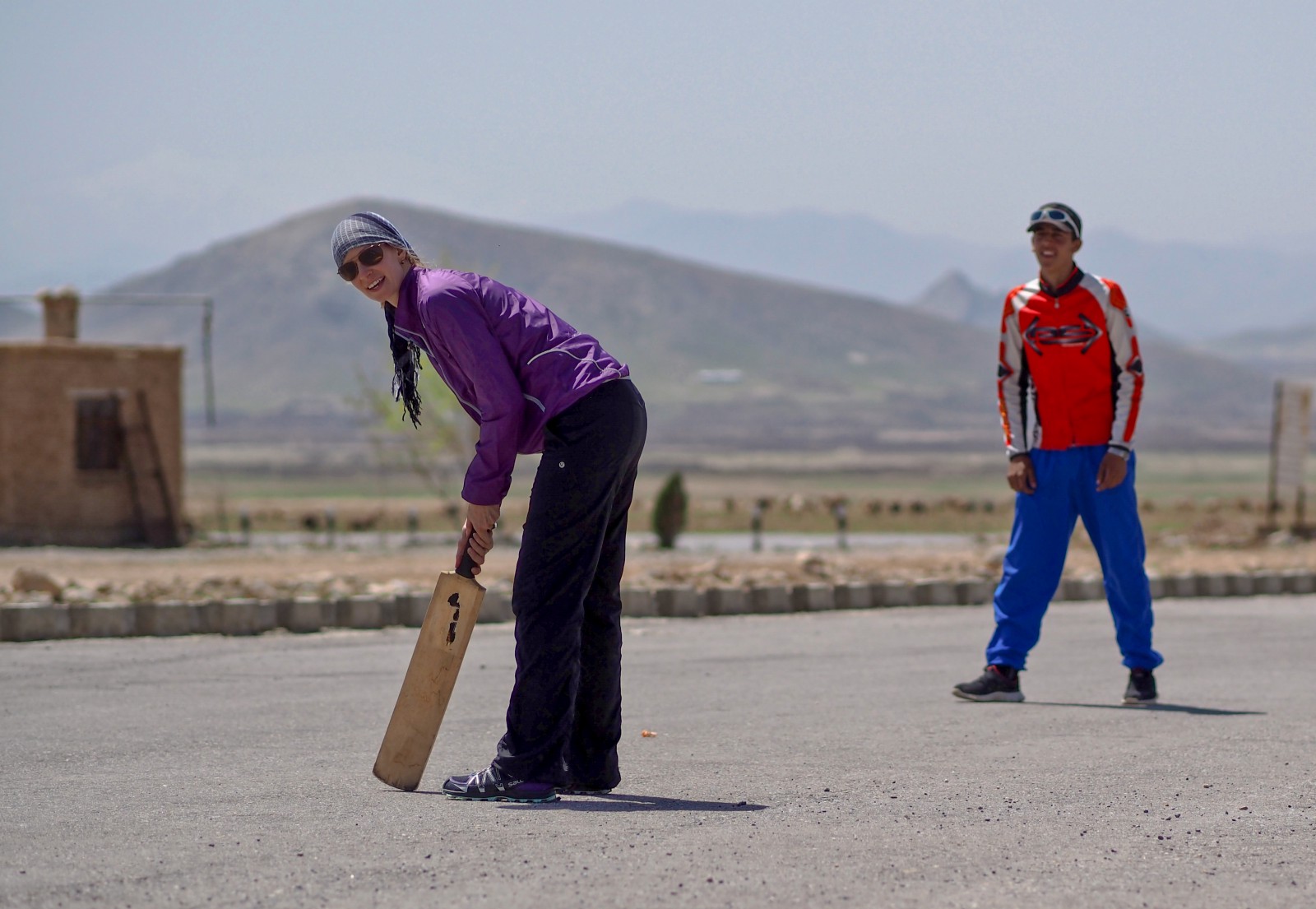
On the outskirts of Kabul, Galpin plays cricket with a group of young Afghans. (Photo:
Deni Ellis Béchard)
As for the men who have a more conservative view of women’s rights, I approach the subject by discussing the concrete benefits to family and community. Once, I was discussing women’s education in a rural Afghan village. The village had no school for girls nor was there one in the vicinity. They were not interested in having a school for the girls, and after many visits I accepted that this would not change anytime soon. I had tea with a dozen local men, and we started discussing other concerns in the village, one being lack of health care for women. Afghanistan has some of the highest infant and maternal mortality rates in the world, mostly due to lack of female midwives and doctors, because, in many cases, male doctors are not allowed to see a woman naked and therefore cannot deliver babies, even if the woman is going to die in childbirth. I discussed doing skilled birth attendant training for the women. Unlike midwife programs that take two years in Afghanistan and require high school education, skilled birth attendant programs require only basic literacy.
The men immediately asked if I could arrange such a training in their village, and they offered up their wives as participants. I asked if there were any women in the village who could read. The answer was no — not one. Then how would they read the medicine labels? How would they follow a medical checklist to make sure they were doing everything correctly to help save lives? The men discussed this, and it seemed the conversation had hit an impasse. The next day all the men came back to talk about building a school for girls in the village so that they could someday train women to be midwives.
Given the challenges we’ve discussed — both in Afghanistan and the U.S. — do you see signs of hope either in America or abroad?
The biggest sign of hope I see is that we are actively, openly, and, in many cases, loudly, talking about gender violence and women’s rights. Ten or 20 years ago I don’t remember discussing girls’ education as the key to economic success and conflict resolution. Rape and gender violence were rarely discussed publicly. Now they are in major media and social media feeds daily. The U.N. created U.N. Women. We celebrate women’s international day every March 8th. I see media attention and viral social media discussions around these issues that once may have stayed as a side note in a local paper — stories like the Steubenville rape, or the India gang rapes, or Bibi Aisha gracing the cover of Time without her nose or ears. Women’s rights is front and center, and we aren’t embarrassed or afraid to talk about the tougher sides of that anymore.
We’re also discussing ideas like feminist foreign policy. In 2014, the new Swedish minister of foreign affairs, Margot Wallström, publicly announced that Sweden would develop a feminist foreign policy, which has been backed up recently by its government’s refusal to renew a bilateral arms agreement with Saudi Arabia because of their women’s rights abuses.
Do you think that many Americans realize that, both domestically and globally, the women’s rights movement is addressing urgent human rights and civil rights questions?
I think they are beginning to have the conversation that women’s rights are human rights. Hillary Clinton made women’s rights a large part of her work as secretary of state. Organizations and movements like V Day, Girl Rising, the Girl Effect, and Half the Sky have brought the conversation to a more mainstream audience, as has Jimmy Carter, with his book in which he writes that the world’s discrimination and violence against women and girls is “the most serious, pervasive, and ignored violation of basic human rights.”
But there is still this feeling I have as a feminist that feminism is under attack, that standing up for your rights and talking about these issues needs to be explained. We shouldn’t have to explain why we are talking about the proliferation of rape on college campus, or human trafficking becoming a global epidemic, or that my own right to choose what to do with my own body via Roe v. Wade is getting attacked. We should, as a society, be looking for concrete solutions to these problems.
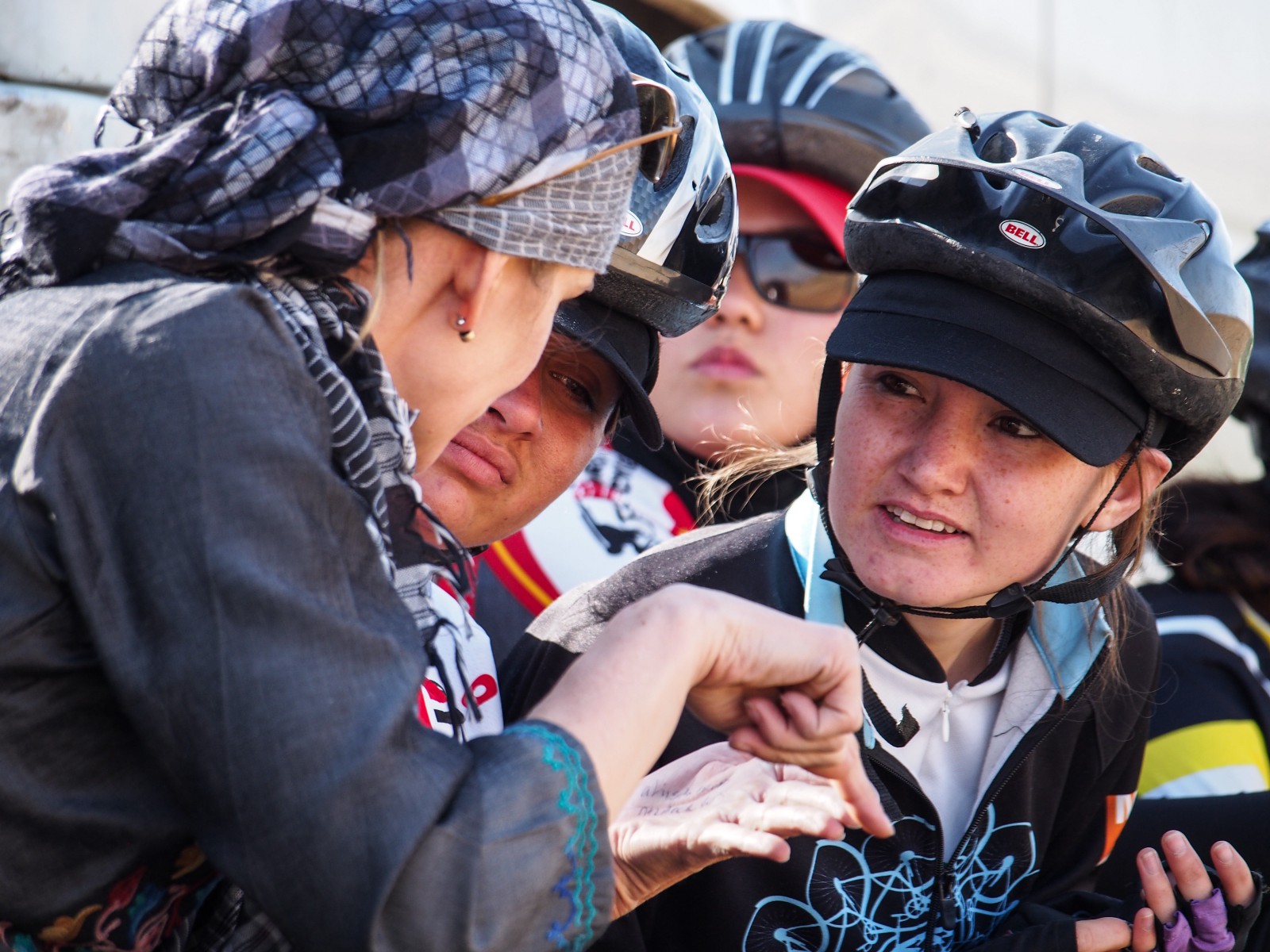
Galpin coaches the young women of the National Cycling Team on a ride near Kabul. (Photo:
Deni Ellis Béchard
)
This brings me back to the underlying similarities I see globally. In particular, we can look at a comparison between Afghanistan and the U.S. No one in the U.S. would think our women’s rights are anywhere near as bad as Afghanistan’s, a country repeatedly ranked as one of the worst in the world to be a woman. But in both countries, you see an astounding variety of ways to put blame on women for how men behave. We have endless discussions in the West about rape in relationship to how women dress, drink, and act, but we are shocked to see women forced to wear the equivalent of a bed sheet with holes for eyes to keep them out of the sight of men — as if the burqa prevents lust and therefore unwanted male sexual aggression. The same logic underpins both the burqa and the blaming of rape victims in America.
What are the ways to break through to people and inspire them to take action?
I think we have to stop presenting activists as only the larger than life human rights leaders like Martin Luther King, Nelson Mandela, Gandhi. It’s hard for people to relate to that and realize that their actions can make a difference. Apathy to problems can often result from feeling overwhelmed or incapable of making a difference. Small projects that fit into busy lives allow people to lead more purposeful lives. Even my own approach isn’t right for most people. Activism should be about awareness and action, however small. People need to put their focus and their will into the arenas they are passionate about and take on what they feel they can manage. Problems like global warming, gender violence, female genital mutilation, animal rights, food deserts, racism, and discrimination against LGBT people are not going to be solved by large non-governmental organizations or governments alone. If they had the ability, we wouldn’t be talking about solving them. These issues require citizen diplomacy — every individual citizen stepping up.
This interview has been edited for length and clarity.





